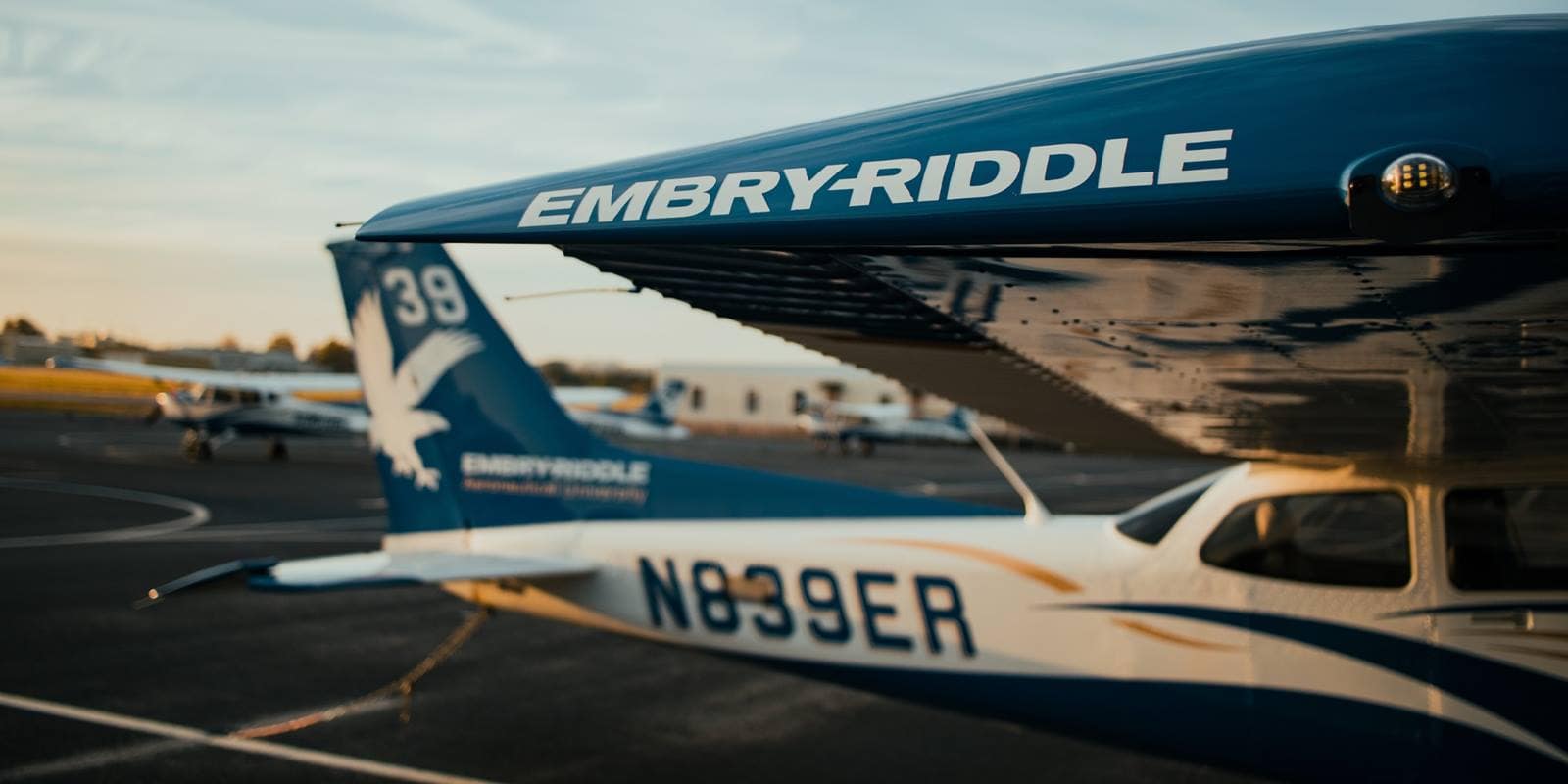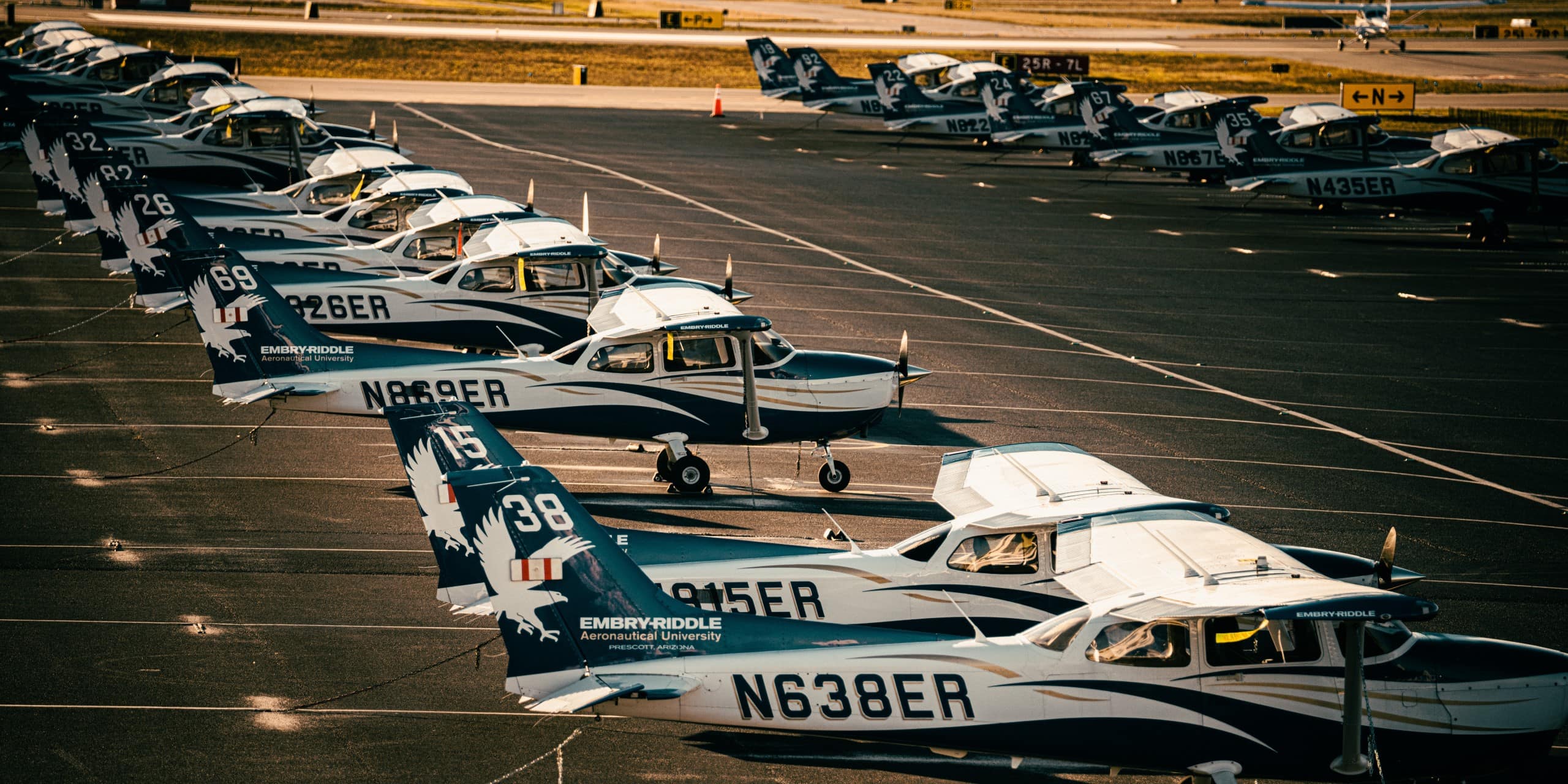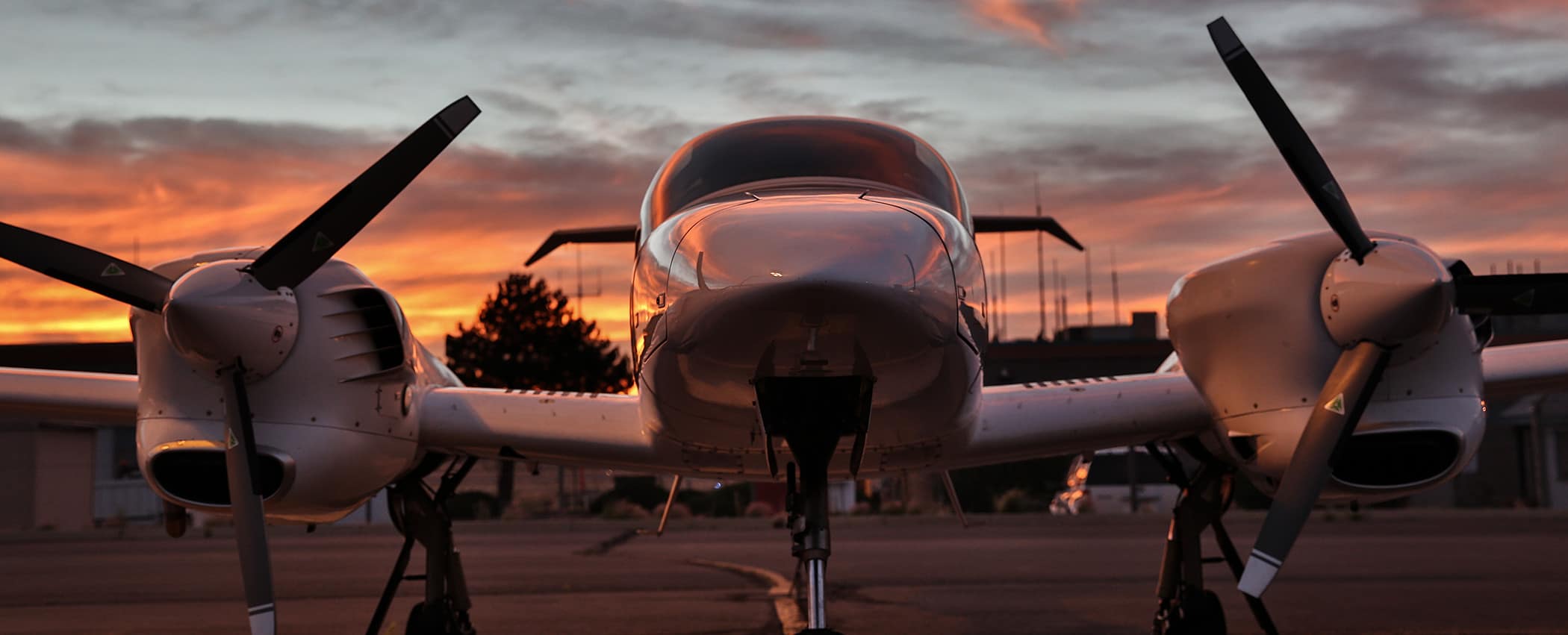
Master of Science in
Aviation
The Master of Science in Aviation enhances student knowledge in data analysis and project management as it applies to aviation operations and airport management.
About the Master of Science in Aviation
Gain new insights and a deeper understanding of aviation and aerospace with a Master of Science in Aviation at Embry-Riddle Aeronautical University. This multi-disciplinary aviation graduate program will enhance your knowledge in behavioral sciences, data analysis, modeling, simulation and project management.
Being part of the Embry‑Riddle Aeronautical University community is a significant advantage as you continue your education. Students graduate from the aviation graduate program with competitive knowledge, thanks to the broad research background, technical experience and airport management skills the curriculum offers.
Student Learning Outcomes
Opportunities available to you while receiving a master's degree in Aviation:
- Specialize in an area of industry interest
- Gain perspective and experiences in a unique learning environment
- Grow your industry network
- Access to faculty experts in the field
Aviation Career Opportunities
Careers and Employers
The Embry-Riddle aviation graduate program boasts a high 91.7% placement rate within one year of graduation. Many graduates transition into positions such as research assistants, aerodynamic engineers, airport operations supervisors, safety engineers and systems engineers.
Aviation graduates tend to enter the industry with companies such as:
- The Boeing Company
- Cessna Aircraft Company
- Collins Aerospace
- Lockheed Martin
- Rolls-Royce
Aviation Salary Information
As of 2022, alumni with a Master of Science in Aviation tend to receive competitive salaries, with an average income of $64,000 annually in the first year after graduation.
DETAILS
About Aviation at the Daytona Beach, FL Campus
The Master of Science in Aviation enhances your knowledge of behavioral sciences, data analysis, modeling and simulation, project management, systems integration, applied research, statistics, technology, and, most importantly, your specialization subject matter.
With the Aviation master's degree at the Daytona Beach campus, you can explore opportunities in aviation operations, airport management, air traffic systems planning, and aviation safety. The labs and facilities in which you learn are built to give you one-of-a-kind experiences in real-world scenarios.
Tracks/Specialties and/or Certificates
Specializations
- Air Traffic Management Specialization
- Aviation/Aerospace Management and Sustainability Specialization
- Aviation/Aerospace Operations Specialization
- Aviation/Aerospace Safety Systems Specialization
- Space Operations Specialization
- Unmanned Aerospace Systems Specialization
Aviation Information
- Credits: 33
- Mode of Study: In-Person
- Thesis: Thesis & Capstone Research Project Option
Helpful Links
- Tour our Daytona Beach campus
- Discover the Department's Faculty
- Explore the Fields of Study: Aviation & Space
- Find Related Clubs & Organizations
Student Learning Outcomes
Students will:
- Apply mathematics, science, and applied sciences at a level appropriate to aviation-related disciplines at the master’s level, including an adequate foundation in statistics.
- Analyze data at the master’s level.
- Work effectively on multi-disciplinary and diverse teams.
- Make professional and ethical decisions.
- Communicate effectively, using both written and oral communication skills.
- Engage in and recognize the need for life-long learning.
- Assess contemporary issues.
- Use the techniques, skills, and modern technology necessary for professional practice.
- Assess the national and international aviation environment.
- Apply pertinent knowledge in identifying and solving problems.
- Apply knowledge of business sustainability to aviation issues.
- Apply advanced qualitative and quantitative problem-solving skills.
Degree Requirements
Air Traffic Management Specialization
(For students with NO ATC experience)
| MSAV Core Requirements | ||
| Required Courses | 12 | |
| MSA 540 | The Air Transportation System | 3 |
| MSA 545 | Human Factors in the Aviation/Aerospace Industry | 3 |
| or MSA 554 | Project Management in Aviation Aerospace | |
| MSA 662 | Statistical Analysis for Aviation/Aerospace | 3 |
| MSA 670 | Research Methods in Aviation/Aerospace | 3 |
| Specialization Requirements | ||
| Required Courses | 9 | |
| MSA 520 | Introduction to Air Traffic Control Tower | 3 |
| MSA 617 | En route Radar Operations | 3 |
| MSA 623 | Advanced Air Traffic Control Tower | 3 |
| Electives | ||
| MSA 508 | Advanced Airport Modeling | 3 |
| MSA 515 | Aviation/Aerospace Simulation Systems | 3 |
| MSA 547 | Leadership and Critical Decision Making in the Aviation Industry | 3 |
| MSA 608 | Aviation/Aerospace Accident Investigation and Analysis | 3 |
| MSA 636 | Advanced Aviation/Aerospace Planning Systems | 3 |
| Select one of the following options: | 12 | |
| Option I: Capstone | ||
| MSA 691 | Graduate Capstone Research Project | 3 |
| MSA Electives from the above list of electives or any MSA electives (500-600) | 9 | |
| Option II: Thesis | ||
| MSA Electives from the above list of electives or any MSA Electives (500-600 Level). | 6 | |
| MSA 700 | Thesis | 6 |
| Total Credits | 33 | |
| For students with no ATC experience or education and for AT-CTI students, the following undergraduate foundation prerequisite courses are required: | ||
| Required Undergraduate Foundation | ||
| AT 202 | Introduction to Air Traffic Management | 3 |
| AT 305 | Introduction to Terminal Radar Operations | 3 |
| AT 401 | Advanced Terminal Radar Operations | 3 |
Aviation/Aerospace Management and Sustainability Specialization
| MSAV Core Requirements | ||
| Required Courses | 12 | |
| MSA 540 | The Air Transportation System | 3 |
| MSA 545 | Human Factors in the Aviation/Aerospace Industry | 3 |
| or MSA 554 | Project Management in Aviation Aerospace | |
| MSA 662 | Statistical Analysis for Aviation/Aerospace | 3 |
| MSA 670 | Research Methods in Aviation/Aerospace | 3 |
| Specialization Requirements | ||
| Select three of the following: | 9 | |
| MSA 508 | Advanced Airport Modeling | 3 |
| MSA 547 | Leadership and Critical Decision Making in the Aviation Industry | 3 |
| MSA 573 | Agent-based Modeling (ABM) for Aerospace and Aviation Systems | 3 |
| MSA 600 | Sustainable Aviation and Aerospace Perspectives | 3 |
| MSA 609 | Aircraft Maintenance Management | 3 |
| MSA 636 | Advanced Aviation/Aerospace Planning Systems | 3 |
| MSA 641 | Production and Procurement Management in the Aviation/Aerospace Industry | 3 |
| MSA 642 | International Aviation Policy | 3 |
| MSA 644 | Integrated Logistics Support in Aviation/Aerospace | 3 |
| Note: Only one BA/MGMT courses may be selected with permission of the Program Coordinator. | ||
| Select one of the following options: | 12 | |
| Option I: Capstone | ||
| MSA 691 | Graduate Capstone Research Project | 3 |
| MSA Electives (500-600 Level) | 9 | |
| Option II: Thesis | ||
| MSA Electives (500-600 Level) | 6 | |
| MSA 700 | Thesis | 6 |
| Total Credits | 33 | |
Aviation/Aerospace Operations Specialization
| MSAV Core Requirements | ||
| Required Courses | 12 | |
| MSA 540 | The Air Transportation System | 3 |
| MSA 545 | Human Factors in the Aviation/Aerospace Industry | 3 |
| or MSA 554 | Project Management in Aviation Aerospace | |
| MSA 662 | Statistical Analysis for Aviation/Aerospace | 3 |
| MSA 670 | Research Methods in Aviation/Aerospace | 3 |
| Specialization Requirements | ||
| Select three of the following: | 9 | |
| MSA 508 | Advanced Airport Modeling | 3 |
| MSA 515 | Aviation/Aerospace Simulation Systems | 3 |
| MSA 516 | Applications in Crew Resource Management | 3 |
| MSA 547 | Leadership and Critical Decision Making in the Aviation Industry | 3 |
| MSA 562 | Situation Awareness and Performance in Aviation/Aerospace | 3 |
| MSA 573 | Agent-based Modeling (ABM) for Aerospace and Aviation Systems | 3 |
| MSA 619 | Airport Certification and Operations Safety | 3 |
| MSA 620 | Air Carrier Operations | 3 |
| MSA 622 | Corporate Aviation Operations | 3 |
| Note: One BA/MGMT Courses may be selected with permission of the Program Coordinator. | ||
| Select one of the following options: | 12 | |
| Option I: Capstone | ||
| MSA 691 | Graduate Capstone Research Project | 3 |
| MSA Electives (500-600 Level) | 9 | |
| Option II: Thesis | ||
| MSA Electives (500-600 Level) | 6 | |
| MSA 700 | Thesis | 6 |
| Total Credits | 33 | |
Aviation/Aerospace Safety Systems Specialization
| MSAV Core Requirements | ||
| Required Courses | 12 | |
| MSA 540 | The Air Transportation System | 3 |
| MSA 545 | Human Factors in the Aviation/Aerospace Industry | 3 |
| or MSA 554 | Project Management in Aviation Aerospace | |
| MSA 662 | Statistical Analysis for Aviation/Aerospace | 3 |
| MSA 670 | Research Methods in Aviation/Aerospace | 3 |
| Specialization Requirements | ||
| Select three of the following: | 9 | |
| MSA 516 | Applications in Crew Resource Management | 3 |
| MSA 562 | Situation Awareness and Performance in Aviation/Aerospace | 3 |
| MSA 608 | Aviation/Aerospace Accident Investigation and Analysis | 3 |
| MSA 611 | Aviation/Aerospace System Safety | 3 |
| MSA 619 | Airport Certification and Operations Safety | 3 |
| MSA 621 | Aviation/Aerospace Safety Program Management | 3 |
| Select one of the following options: | 12 | |
| Option I: Capstone | ||
| MSA 691 | Graduate Capstone Research Project | 3 |
| MSA Electives (500-600 Level) | 9 | |
| Option II: Thesis | ||
| MSA Electives (500-600 Level) | 6 | |
| MSA 700 | Thesis | 6 |
| Total Credit | 33 | |
Space Operations Specialization
| MSAV Core Requirements | ||
| Required Courses | 12 | |
| MSA 540 | The Air Transportation System | 3 |
| MSA 545 | Human Factors in the Aviation/Aerospace Industry | 3 |
| or MSA 554 | Project Management in Aviation Aerospace | |
| MSA 662 | Statistical Analysis for Aviation/Aerospace | 3 |
| MSA 670 | Research Methods in Aviation/Aerospace | 3 |
| Specialization Requirements | 9 | |
| Select three of the following: | ||
| MSA 501 | The Satellite Communications Industry | 3 |
| MSA 502 | Cybersecurity Applications in Space | 3 |
| MSA 504 | Space Technology and Systems | 3 |
| MSA 505 | The Launch Industry | 3 |
| MSA 511 | Earth Observation and Remote Sensing | 3 |
| MSA 512 | Space Mission and Launch Operations | 3 |
| MSA 513 | Space Habitation and Life Support Systems | 3 |
| MSA 601 | Applications in Space: Commerce, Defense, and Exploration | 3 |
| Select one of the following options: | 12 | |
| Option I: Capstone | ||
| MSA 691 | Graduate Capstone Research Project | 3 |
| MSA Electives (500-600 Level) | 9 | |
| Option II: Thesis | ||
| MSA Electives (500-600 Level) | 6 | |
| MSA 700 | Thesis | 6 |
| Total Credits | 33 | |
Uncrewed Systems Specialization
| MSAV Core Requirements | ||
| Required Courses | 12 | |
| MSA 540 | The Air Transportation System | 3 |
| MSA 545 | Human Factors in the Aviation/Aerospace Industry | 3 |
| or MSA 554 | Project Management in Aviation Aerospace | |
| MSA 662 | Statistical Analysis for Aviation/Aerospace | 3 |
| MSA 670 | Research Methods in Aviation/Aerospace | 3 |
| Specialization Requirements | ||
| Select three of the following: | 9 | |
| MSA 534 | Application of Uncrewed Systems | 3 |
| MSA 535 | Current Issues in Uncrewed Systems | 3 |
| MSA 538 | Legal and Regulatory Issues in Uncrewed Systems | 3 |
| MSA 624 | sUAS Operational Planning and Safety Management | 3 |
| MSA 625 | Uncrewed Systems Interoperability and Control | 3 |
| MSA 635 | Uncrewed Systems Operational Configuration | 3 |
| Select one of the following options: | 12 | |
| Option I: Capstone | ||
| MSA 691 | Graduate Capstone Research Project | 3 |
| MSA Electives (500-600 Level) | 9 | |
| Option II: Thesis | ||
| MSA Electives (500-600 Level) | 6 | |
| MSA 700 | Thesis | 6 |
| Total Credits | 33 | |
Get Started Now:
Summary
33 Credits
Estimate your tuition by using the Tuition Calculator
View Financial Aid Information
Learn about our General Education
Find out about transferring credits to this degree
Learn more about our Veterans & Military benefits
View our Academic Calendar




